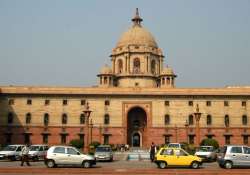India declines security clearance to three Iranian banks
New Delhi, July 22: The Home Ministry has declined security clearance to three Iranian banks intending to open branches in India which would have made easier for Indian companies trade with that country. Security clearance

New Delhi, July 22: The Home Ministry has declined security clearance to three Iranian banks intending to open branches in India which would have made easier for Indian companies trade with that country.
Security clearance to Parsian Bank, Bank Pasargad and Eghtesad-e-Novin Bank has been denied fearing possibility of money laundering and terror financing in transactions through them, official sources said.
The government move follows India accepting international guidelines set by the Financial Action Task Force (FATF), based in Paris.
India, which became its member in 2010, is required to follow its international guidelines to check money laundering and terror-financing activities.
Branches of Iranian banks in India may have helped oil and other companies which face difficulties in trade with Iranian companies in view of the US sanctions on Tehran. India exports rice, wheat, tea, yarn, textiles, fertilisers and machineries while it imports crude oil.
The target fixed for import of crude oil from Iran for 2012-13 is approximately 15.5 million tons. Total crude oil imported from Iran by Indian companies during 2010-11 and 2011-12 was 18.50 million tons and 17.44 million tons respectively.
India has been facing difficulty in finding banks to transfer payments to Iran ever since Reserve Bank of India dismantled the 1974 Asian Clearing Union mechanism in December 2010.
A new payment system has evolved last month under which both the countries agreed that Indian importers of Iranian crude oil can make 45 per cent of their payments in rupees, which Iran will park in a local bank and use it to settle payments to Indian exporters.
Under the mechanism agreed, National Iranian Oil Company will accept 45 per cent of the payments in an account opened in Kolkata-based UCO Bank. UCO Bank was chosen because it has no US or European exposure and its overseas presence is limited to Hong Kong, Singapore and China.
Security clearance to Parsian Bank, Bank Pasargad and Eghtesad-e-Novin Bank has been denied fearing possibility of money laundering and terror financing in transactions through them, official sources said.
The government move follows India accepting international guidelines set by the Financial Action Task Force (FATF), based in Paris.
India, which became its member in 2010, is required to follow its international guidelines to check money laundering and terror-financing activities.
Branches of Iranian banks in India may have helped oil and other companies which face difficulties in trade with Iranian companies in view of the US sanctions on Tehran. India exports rice, wheat, tea, yarn, textiles, fertilisers and machineries while it imports crude oil.
The target fixed for import of crude oil from Iran for 2012-13 is approximately 15.5 million tons. Total crude oil imported from Iran by Indian companies during 2010-11 and 2011-12 was 18.50 million tons and 17.44 million tons respectively.
India has been facing difficulty in finding banks to transfer payments to Iran ever since Reserve Bank of India dismantled the 1974 Asian Clearing Union mechanism in December 2010.
A new payment system has evolved last month under which both the countries agreed that Indian importers of Iranian crude oil can make 45 per cent of their payments in rupees, which Iran will park in a local bank and use it to settle payments to Indian exporters.
Under the mechanism agreed, National Iranian Oil Company will accept 45 per cent of the payments in an account opened in Kolkata-based UCO Bank. UCO Bank was chosen because it has no US or European exposure and its overseas presence is limited to Hong Kong, Singapore and China.